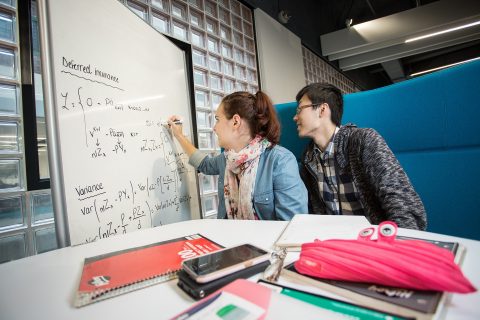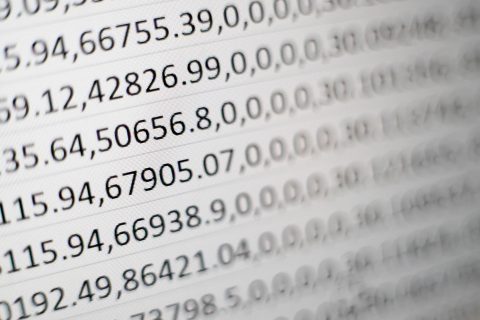Data Science (BA/BSc)
Why study Data Science?
In today’s economy, businesses and institutions rely on data analysis to reach their goals. Data collection is made possible by technological advancements, but insightful data analysis requires human expertise. That’s where a degree in data science comes in. Data analysis is an essential part of working in almost every field today. For this reason, data scientists are in high demand across economic sectors. Students in the Data Science program will develop a broad array of practical skills including:
Data science applications in mathematics and statistics, computer science, artificial intelligence, ethics and communication.
Both theoretical understanding and hands-on experience
Program highlights
Provides exposure to cutting-edge disciplines such as machine learning, neural networks and other artificial intelligence topics.
Special funding for out-of-province students
Up to $4000 for undergraduate programs.
Program structure
A Bachelor of Arts or Science degree takes a minimum of three or four years (90 – 120 credits) of full-time study, depending on your academic background.
The core of the Data Science program integrates two main components.
- The first offers foundational training in mathematics and statistics along with more hands-on exposure to data science applications through data science labs and machine learning courses.
- The second component provides exposure to traditional computer science topics such as programming, databases and algorithms, plus the opportunity to learn cutting-edge topics in artificial intelligence.
The curriculum also includes a course in technical writing and one about social and ethical dimensions of technology, which provide the opportunity to develop soft skills that are useful in the area of data science.
Courses
Co-op program
The Co-op program gives academically strong students a chance to complete paid work terms and gain practical experience in their field. Placements range from provincial and federal government departments to companies in insurance, banking and telecommunications. Co-op work terms make it possible for you to do:
- Quantitative and qualitative analyses
- Policy research
- Econometric analyses and interpretation of survey data
Entry to the program requires an interview and a high level of academic performance.
Note: The Co-op program is only available for the Specialization and Honours.
United States students: A U.S. Federal Student Aid-eligible version of this program is offered. This version meets all U.S. regulations (such as no co-operative education or e-courses) for eligible programs.
Admission criteria
Minimum cut-off averages and course requirements
- Quebec CEGEP: 27 overall, 26 math
- Admission is based on the CRC requirements indicated above and completion of the following classes as part of their DEC: Calculus 1, Calculus 2, Linear Algebra; Mechanics, Electricity and Magnetism and Wave, Optics and Modern Physics; General Chemistry and Chemistry of Solutions; General Biology (OR Cellular Biology AND Ecology and Evolution)
- Additional information for CEGEP applicants
- High School: A- overall, A- math, B+ in science
- One math from Pre-Calculus, Calculus, or equivalent
- Two sciences (from Biology, Chemistry or Physics)
- Canadian curricula course requirements
- Accepted international qualifications
- ACT or SAT is not required
- AP exams are not required but may qualify you for advanced standing
- International Baccalaureate (IB) diploma: 33 overall, 5 HL or 6 SL math, 5 HL science
- one math (Applications and Interpretations HL, Analysis and Approaches HL or Analysis and Approaches SL)
- one science (Physics, Chemistry or Biology, either SL or HL)
- one of the math or science courses must be completed at the HL level
- International Baccalaureate Career-related Programme (CP): 5.5/7 overall, 5 HL or 6 SL math, 5 HL science
- one math (Applications and Interpretations HL, Analysis and Approaches HL or Analysis and Approaches SL)
- one science (Physics, Chemistry or Biology, either SL or HL)
- one of the math or science courses must be completed at the HL level
- Additional Career-related Programme (CP) course requirements
- Baccalauréat français: 15 overall, 15 math, 14 in science
- Required courses:
- Première: Spécialité mathématiques and physique-chimie
- Terminale: Spécialité mathématiques (also accepted: Terminale Spécialité physique-chimie and mathématiques complémentaires)
- Terminale: Spécialité physique-chimie recommended but not required
- Additional information for Baccalauréat français applicants
- Required courses:
- British system of education (GCE)
- A-levels: At least two A-level exams AB, A in math, B in science or
- AS-levels: At least 4 AS-level exams with equivalent results or
- BTEC: Level 3 Diploma or Extended Diploma in a related subject area with equivalent results
- Students without A-level math may be admissible based on AS-level or iGCSE/GCSE/O-Level exam results. Students should include all their exam results from iGCSE (or equivalent) onwards to support their application.
- Additional information for British System of Education (GCE) applicants
- University Transfers (internal): 3.0 overall, 3.0 in math and science, 2.3 in courses offered by GCS
- At least two of the following (or equivalent): MATH 203, 204, 205
- University Transfers (external): A- overall, A- in math, B+ science
- Courses in the disciplines of Calculus and Linear Algebra
- Courses in two of the following areas: Biology, Chemistry or Physics
Minimum cut-off averages should be used as indicators. The cut-off data may change depending on the applicant pool. Applicants who meet the stated minimum requirements are not guaranteed admission to these programs.
Minimum cut-off averages and course requirements
- Quebec CEGEP: 27 overall, 26 math
- Calculus I and II, Linear Algebra
- Additional information for CEGEP applicants
- High School: A- overall, A- math
- One math from Pre-Calculus, Calculus, or equivalent
- Canadian curricula course requirements
- Accepted international qualifications
- ACT or SAT is not required
- AP exams are not required but may qualify you for advanced standing
- International Baccalaureate (IB) diploma: 33 overall, 5 HL or 6 SL math
- one math (Applications and Interpretations HL, Analysis and Approaches HL or Analysis and Approaches SL)
- International Baccalaureate Career-related Programme (CP): 5.5/7 overall, 5 HL or 6 SL math
- one math (Applications and Interpretations HL, Analysis and Approaches HL or Analysis and Approaches SL)
- Additional Career-related Programme (CP) course requirements
- Baccalauréat français: 15 overall, 15 math
- Required courses:
- Première: Spécialité mathématiques
- Terminale: Spécialité mathématiques
- Additional information for Baccalauréat français applicants
- Required courses:
- British system of education (GCE)
- A-levels: At least two A-level exams AB, A in math, or
- AS-levels: At least 4 AS-level exams with equivalent results or
- BTEC: Level 3 Diploma or Extended Diploma in a related subject area with equivalent results
- Students without A-level math may be admissible based on AS-level or iGCSE/GCSE/O-Level exam results. Students should include all their exam results from iGCSE (or equivalent) onwards to support their application.
- Additional information for British System of Education (GCE) applicants
- University Transfers (internal): 3.0 overall, 3.0 in math, 2.3 in courses offered by GCS
- At least two of the following (or equivalent): MATH 203, 204, 205
- University Transfers (external): A- overall, A- in math
- Courses in the disciplines of Calculus and Linear Algebra
Minimum cut-off averages should be used as indicators. The cut-off data may change depending on the applicant pool. Applicants who meet the stated minimum requirements are not guaranteed admission to these programs.
Application deadlines

FALL ENTRY (September)
Deadline: March 1
U.S. and international applicants: Apply no later than February 1 to allow time for immigration document processing. However, applying earlier is strongly recommended. Immigration processing times vary by country and delays could prevent you from starting your studies on time.

WINTER ENTRY (January)
Deadline: November 1
U.S. and international applicants: Apply no later than August 1 to allow time for immigration document processing. However, applying earlier is strongly recommended. Immigration processing times vary by country and delays could prevent you from starting your studies on time.
We reserve the right to close admission to a program at any time after the official deadline without prior notice.
After your degree
The program targets students expected to directly join the workforce after completion of the undergraduate degree. The program will prepare them to hold a technical position related to the production and analysis of data by providing them with a knowledge base in probability and statistics, data management, and computer programming. The students will have an opportunity to be exposed to various subdisciplines such as artificial intelligence, pure mathematics, and communication.
Student story

Christina Aladas
Specialization in Mathematical and Computational Finance
From statistics to coding, Christina Aladas found the skills she learned complemented each other perfectly as she progressed in her program.
Other programs of interest

Crunch numbers to the nth degree — and see what happens. When you study computer science and mathematics, you’ll use algorithms and computational theory to create mathematical models or define formulas that solve mathematical problems. In other words, you design new tools that can predict the future.
Department
Department of Computer Science and Software Engineering
Faculty

If you’re a problem solver, have great math skills and a keen interest in financial markets, Mathematical and Computational Finance is the field where these skills and interests intersect.
Department
Department of Mathematics & Statistics
Faculty

If you want to learn how to predict the future, consider actuarial mathematics. Actuaries use their mathematical and statistical wizardry to solve problems involving risk and uncertainty.
Department
Department of Mathematics & Statistics
Faculty

